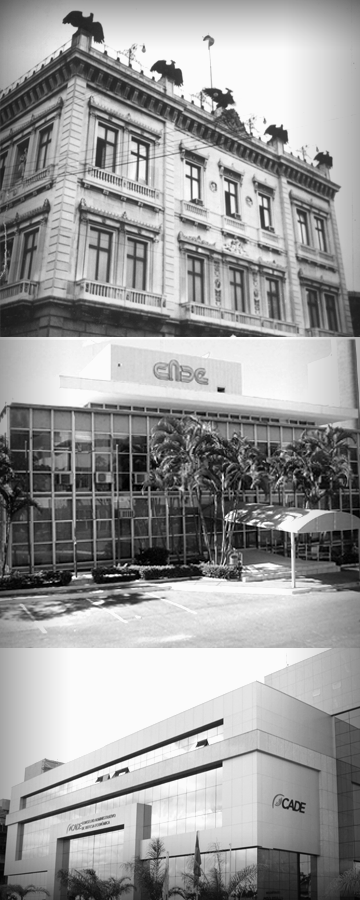Our History
The Administrative Council for Economic Defense - CADE is an independent agency with jurisdiction over the Brazilian territory. CADE was created by the Law Nº 4.137/62 as a body of the Ministry of Justice. At that time, CADE was in charge of monitoring companies’ economic management and accounting system. In June 1994, the body was transformed into an independent agency reporting to the Ministry of Justice, under the regime of the Law Nº 8.884/94.
This Law established the attributions of the Secretariat for Economic Law – SDE in its acronym in Portuguese – a body from the Ministry of Justice, the Secretariat for Economic Monitoring – SEAE in its acronym in Portuguese – a body from the Ministry of Finance and CADE itself. These three bodies composed the Brazilian Competition Defense System – SBDC in its acronym in Portuguese – and they were responsible for the competition defense policy in Brazil. Under this structure, CADE was in charge of judging administrative proceedings related to anticompetitive conducts and of analyzing mergers subject to its review system. The proceedings were instructed by SDE and SEAE. These two bodies would issue non-binding opinions and CADE would then judge the proceedings.
New Competition Law
In May 2012, came into force the new Brazilian Competition Law, Law N° 12.529/11. The SBDC was restructured and the competition defense policy in Brazil changed significantly. According to the new Law, CADE started to be responsible for the instruction of administrative proceedings related to violations against the economic order, as well as for the analysis of mergers – these competences belonged to SDE and SEAE.
CADE gained a new structure, being composed by an Administrative Tribunal, a General Superintendence and a Department of Economic Studies. SDE was extinguished and SEAE ceased to instruct proceedings and started being responsible for the promotion of competition advocacy before bodies of the government and the society.
In the new system, the General Superintendence is responsible for most of the attributions performed by the SDE and the SEAE, as the functions of investigating and instructing proceedings in order to rebuke the abuse of economic power and the analysis of mergers. The Department of Economic Studies is responsible for improving economic analyses and providing greater security on the effects of CADE’s decisions in the market.
Changes
The main change introduced by the Law N° 12.529/2011 was the requirement of prior submission to CADE of mergers that may have anticompetitive effects. According to the former Competition Law, these operations could be notified to CADE after being consummated, making Brazil one of the last countries in the world to adopt an a posteriori merger control. The prior analysis strengthened the legal security to companies and brought more agility to mergers’ analyses. According to the new Competition Law, CADE has up to 240 days to analyze merger cases; this deadline can be extended for more 90 days in cases of complex mergers.
The new Law also modified the minimum value of fines to be applied to companies in cases of anticompetitive conducts. Since May 2012, the fines applicable to violations against the economic order vary between 0,1% to 20% of companies’ invoices in the fields of activity in which the violation occurred. This new systematic increased the capacity of CADE to establish, according to clear criteria, appropriate and proportional penalties for the effectiveness of CADE’s policy against anticompetitive conducts in Brazil.
Despite being an autarchy under a special regime, CADE is not a competition regulatory agency, but an authority for competition defense. CADE is responsible for judging and punishing, administratively and ultimately, individuals and companies that have committed violations against the economic order. Furthermore, CADE analyses mergers, in order to minimize possible negative effects in the competition environment of markets. CADE does not have as attribution the regulation of prices or the analysis of the criminal aspects of conducts it investigates. CADE’s competences differ as well from the competences of other bodies and entities of the Brazilian government, such as the competence of consumer protection, engaged by the Institute for Consumer Protection – PROCON in its acronym in Portuguese – and the National Secretariat for Consumer – SENACON in its acronym in Portuguese.
Nonetheless, by complying its institutional mission of “watching for the maintenance of a healthy competition environment by preventing and repressing conducts against the economic order, even if potentially, in accordance with the due legal process in its material and formal aspects”, CADE dialogues with other public policies, articulating its performance with many institutions bounded directly or indirectly to competition defense and consumer rights.